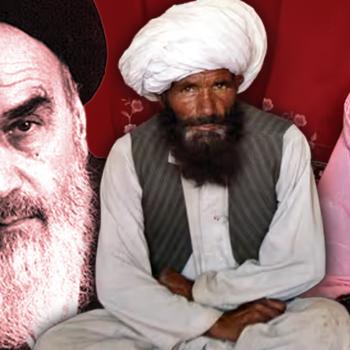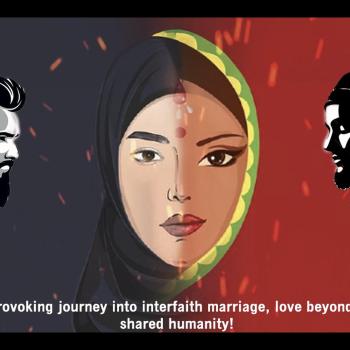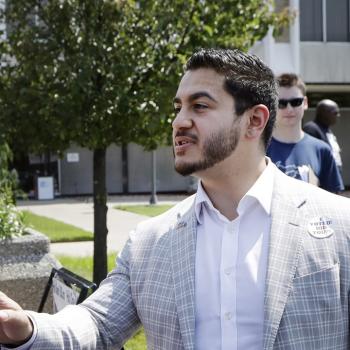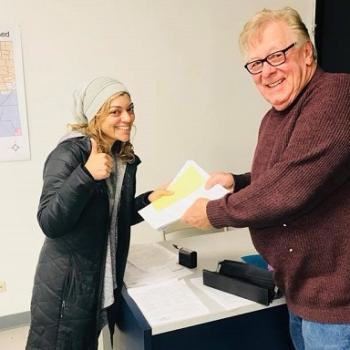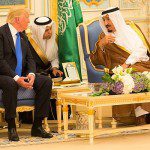 |
|
Author Daveed Gartenstein-Ross
|
If you haven’t heard of Daveed Gartenstein-Ross, you probably will soon. Unlike many of the talking heads and dubious Islam experts that you see on the evening news, Gartenstein-Ross claims a unique perspective – that of someone who experienced life as a conservative Muslim and found himself in the company of a group of Muslims suspected of links to extremist groups abroad. With many accusations against American Muslims and their supposed dual loyalties now losing steam, some readers may fear that Gartenstein-Ross provides (willingly or not) the latest fuel for the ongoing fire of suspicion about Muslims in the West with a book about his experiences entitled My Year Inside Radical Islam. In the upcoming issue of Islamica Magazine, Andrea Useem writes that Gartenstein-Ross’ book, “though less sensational than some might like, offers a window into a more commonplace but no less important experience: that of conversion to Islam today. He reveals how ideologically vulnerable a convert can be; in that first flush of excitement and devotion, almost anyone claiming Islamic authority can dramatically imprint the convert’s faith.” It is this same “flush” that allowed now-infamous converts such as Richard Reid (whom you can thank for having to remove your shoes each time you fly), John Walker Lindh (aka the “American Taliban”), and José Padilla (the citizen “enemy combatant”) to have kept company with more extreme elements in the Muslim community. Unlike these other converts, however, Gartenstein-Ross managed to stumble out of his association with conservative Islam, and then Islam altogether. He is now a terrorism analyst, and feels he is uniquely suited to look into the mind of Muslim extremists, having been one himself, albeit for a very short time and without any actual violence involved. But many on both sides of the terrorism debate are skeptical – anti-terrorism advocates may not be happy with his insistence that there is a peaceful wing of Islam that can prevail, and many Muslims are wary of his current associations with people and organizations whom they perceive as unwilling to differentiate between extremist Muslims and the Muslim masses. Will Gartenstein-Ross, as he hopes, become a bridge between the two that can help forge a common ground where respect for Muslims and abhorrence for terrorism share the same stage? Or will he find himself in a no-man’s-land where his words are tuned out by both sides? Altmuslim Associate Editor Zahir Janmohamed recently sat down with the author in Washington DC and asked him about his journey from a hippie Jewish family in Oregon to a charity with alleged links to Al-Qaeda and finally to Christianity, and how he feels his work will impact the “war on terror” and the average Muslim.
![]() Your book throws out a lot of terms. How do you define the following terms: “radical Islam”, “moderate Islam”, “conservative Islam”?
Your book throws out a lot of terms. How do you define the following terms: “radical Islam”, “moderate Islam”, “conservative Islam”?
In doing a word search through the book manuscript, I find that I use these terms less frequently than the question presumes. The book (quite obviously) uses the phrase “radical Islam,” which in my mind begins at the point the believer thinks that coercion is appropriate to enforce his religious views. So three radical ideas that I encounter in the course of the book are the idea that warfare should be used to topple non-Islamic states and replace them with sharia law; the idea that apostates from the faith should be killed; and the idea that individuals with “deviant” beliefs should be killed.
My book uses the term “moderate Islam” only once: in the final chapter my friend al-Husein Madhany describes himself as being a “moderate Muslim,” and I agree that this is what he has grown into. I’m somewhat uncomfortable with the phrase “moderate Muslim,” but I will continue to use it until I’m struck by a better term. When I use the phrase, I’m generally referring to Muslims who believe in pluralistic values such as those that predominate in the United States.
My book doesn’t use the term “conservative Islam,” but it does refer to me accepting more conservative views over time. Here, I mean a more literalistic, rules-based practice than the Sufi views that I initially embraced: my decisions to grow a beard and to stop listening to music were manifestations of greater theological conservatism.
![]() If part of your goal was to stimulate discussion within the Muslim community about the dangers of “radical” Islam, why then allow the publisher to use this title? How do you respond to accusations that you are simply trying to cash in on your admittedly short stint with “radical” Islam?
If part of your goal was to stimulate discussion within the Muslim community about the dangers of “radical” Islam, why then allow the publisher to use this title? How do you respond to accusations that you are simply trying to cash in on your admittedly short stint with “radical” Islam?
I believe that the title of my book accurately reflects the content, and that in a vacuum it wouldn’t repel a Muslim audience. I think one reason Muslims have suspicions is that in recent months a number of titles with a similar “edge” have been published which do argue that Islam itself is the problem. I couldn’t have foreseen this a year ago when I settled on the title for my book project.
As to accusations that I’m trying to “cash in” on my short stint with radical Islam, I have two responses. The first is that I was established as an analyst in the counterterrorism field long before my story was made public. This was purposeful, as many people have parlayed intriguing biographies into lifetimes of mediocre analysis. The second answer is that although my stint with radical Islam was short, there is value to my description of the radicalization process that some Western converts go through. Too little is known about this process, and I believe that my book helps to fill in this important gap.
![]() You are a national debate champion and what impressed me about the beginning of your book is how methodical you are in analyzing an argument before you internalize it. But as you drifted more into “radical” Islam, I found it odd that you were convinced by arguments by Muslim religious leaders that seemed far below your intellectual level. I was just not convinced that you would buy them.
You are a national debate champion and what impressed me about the beginning of your book is how methodical you are in analyzing an argument before you internalize it. But as you drifted more into “radical” Islam, I found it odd that you were convinced by arguments by Muslim religious leaders that seemed far below your intellectual level. I was just not convinced that you would buy them.
Before I began to take radical arguments seriously, the way in which I approached these questions shifted drastically. Initially, when radical arguments were made, I would look at the end result of those argumentsthe obligation to undertake jihad against non-Muslim societies, for exampleand seeing the absurd conclusion, would reject the argument. My book details the process by which I embraced a more legalistic and rules-based interpretation of the faith. In this way, I began to look at these questions not by examining end results, but by examining only the Qur’an, the Sunnah, and the opinion of scholarsand ignoring any external evidence. I came to believe that my own conscience was not just irrelevant, but that I should in fact distrust it.
Approached through this more legalistic lens, I’m not sure that these arguments are as weak as the question presumes. One radical argument I became convinced by was the obligation to undertake jihad to replace non-Islamic government with Islamic rule, as Sheikh Abdullah bin Muhammad bin Humaid outlines in his lengthy essay “The Call to Jihad (Holy Fighting for Allah’s Cause) in the Qur’an.” He argues that there are three phases of jihad historically: it was initially forbidden by Allah, then permitted, and finally made obligatory “(1) against them who start the fighting’ against you (Muslims) . . . (2) and against all those who worship others along with Allah.” He bears out this point by noting Muhammad’s initial non-violent response to the Quraish tribe’s oppression, followed by the revelation of verses 22:39-40 making jihad permissible in certain circumstances, and finally verses 2:190 and 9:29 making jihad compulsory. While I have seen sound responses to bin Humaid’s argument, I haven’t seen a “clean kill” that would cause me to write off this argument as below my intellectual level.
Likewise, another radical argument I accepted was the permissibility of killing those who convert out of Islam. I was persuaded by this view on the basis of a single hadith, a fact which dovetails with the tendency of some Muslims (sometimes new converts, sometimes very strict and constrained individuals) to read the ahadith in the same way they read Qur’anic verses, and to drawn very broad conclusions based on a line or two in the ahadith. A number of Muslim writers have attacked the punishment of apostates as un-Islamic (for example, former Pakistani chief justice S.A. Rahman does so in his book Punishment of Apostasy in Islam, and Ali Eteraz has done so on his blog). That being said, I can’t say that A.A. Maududi’s book The Punishment of the Apostate According to Islamic Law makes arguments that are below my intellectual level.
Obviously, I strongly and unreservedly reject the arguments of bin Humaid and Maududi in this regard. But I think it’s important not to underestimate the intellectual draw that radicalism can hold for some.
![]() At times in your book, I felt that you were using your past experiences (and errors) to self-aggrandize your new, post-(radical) Islam enlightenment. Looking back at your experience as a Muslim, is there anything that you cherish about that experience? Anything that you perhaps miss?
At times in your book, I felt that you were using your past experiences (and errors) to self-aggrandize your new, post-(radical) Islam enlightenment. Looking back at your experience as a Muslim, is there anything that you cherish about that experience? Anything that you perhaps miss?
There is much that I cherished about my experience as a Muslim. My time within the faith prior to starting work at Al Haramain was a happy and fulfilling time spiritually. There are certain things that I do miss about Islamic practice. I used to really enjoy getting up at dawn for fajr prayers. I appreciated having a universal greeting that any other Muslim could understand, regardless of what language he spoke. And the mosque tends to be a far more communal institution than the church. In converting out of Islam, I didn’t conclude that the faith is inherently radical; I didn’t conclude that it has nothing of value.
That being said, I’m happy with my current religious life, and derive a sense of fulfillment from my worship as a Christian.
![]() The book seemed to be less about the dangers of “radical” Islam and more about the zeal of converts and where that zeal often leads them. Do you think this is a fair assessment?
The book seemed to be less about the dangers of “radical” Islam and more about the zeal of converts and where that zeal often leads them. Do you think this is a fair assessment?
Pretty much. The book isn’t so much an expos of radical Islam as a description of the inner journey that can lead one to embrace extremism. The outward expos has been done time and again; much less has been written about the inner journey.
![]() What struck me about your book is your very sympathetic and even complimentary views of Islam and Muslims. This is a departure from other pundits who argue that Islam itself is the problem and “moderate” Muslims aren’t following it correctly. What are your thoughts on how conservative commentators on terrorism portray the Muslim community?
What struck me about your book is your very sympathetic and even complimentary views of Islam and Muslims. This is a departure from other pundits who argue that Islam itself is the problem and “moderate” Muslims aren’t following it correctly. What are your thoughts on how conservative commentators on terrorism portray the Muslim community?
I believe there is a need for a more objective and fact-based assessment of the Muslim community. I support exposing Muslim organizations or leaders who are promoting an extremist agenda. But in a forthcoming op-ed, I argue that there are three negative tendencies that arise when commentators discuss Islam in America. The first is constant criticism of the Muslim community that isn’t counterbalanced by compliments or discussion of progress within the community. Criticism can produce a skewed view when it isn’t balanced by positive news. Talk radio hosts frequently ask me why moderate Muslims don’t speak against extremismas though all moderates are cowed into silence while jihad is openly extolled from mosque pulpits. Commentators would do well to acknowledge important moderate voices like Islamica Magazine and altmuslim.com even if they don’t always agree with the political views in those publications.
This brings us to the second negative tendency, the conflation of political disagreement with theological radicalism. After a recent talk I gave, I was told that Islamica is a “radical Islamist publication” because of an article that objected to the Department of Homeland Security’s revocation of Swiss scholar Tariq Ramadan’s visa. My interlocutor may have disagreed with the article’s conclusion, but should have realized that it was not a radical article, nor did it make Islamica a radical publication.
Third, there is an impulse to attack Muslim figures but never to defend them. Commentators would do themselves a favor by occasionally weighing in when some Muslims are unfairly branded as radicals. But a necessary first step is getting to know people in the Muslim community well enough that you’re comfortable going out on a limb to defend someone against charges of radicalism.
As a final note, it’s my hope that if these steps are taken, the Muslim community will in turn become less defensive about commentators’ legitimate criticisms.
![]() Even though you are in the counterterrorism field now, your book says very little about how your experiences connect to your present work, and what you think your experiences mean about the nature of “radical” Islam or Islam as practiced in the United States. Why is that?
Even though you are in the counterterrorism field now, your book says very little about how your experiences connect to your present work, and what you think your experiences mean about the nature of “radical” Islam or Islam as practiced in the United States. Why is that?
I chose to keep the book non-polemical in order to allow the reader to reflect and reach his own conclusions. Often reality cannot be tied into a neat bow, and some authors cheapen otherwise valuable stories by clumsily attempting to do so. Different people will draw different lessons from my story, and I think this is a good thing.
![]() In a recent Slate review of your book, Holly Lebowitz Rossi writes: “There was nothing particularly radical about Gartenstein-Ross’ experience with Islam in the first place, except for a few alarming opinions that he briefly subscribed to in his mind as a very young man… The book would be better titled My Yearlong Internship at a Charity That I Had No Idea Was Funding al-Qaida.” Your response?
In a recent Slate review of your book, Holly Lebowitz Rossi writes: “There was nothing particularly radical about Gartenstein-Ross’ experience with Islam in the first place, except for a few alarming opinions that he briefly subscribed to in his mind as a very young man… The book would be better titled My Yearlong Internship at a Charity That I Had No Idea Was Funding al-Qaida.” Your response?
I think Rossi’s review is a dishonest piece of writingand I do not say this lightly. The passage you selected happens to epitomize the reason for my conclusion. Halfway through the review Rossi asserted that my job at Al Haramain was an internship, and then referred to it that way five times, including in her made-up title for my book. Rossi’s editors decided, rightly, to issue a factual correction since the job was not, in fact, an internship. The line you quoted now reads “The book would be better titled My Yearlong Job at a Charity That I Had No Idea Was Funding al-Qaeda” which is nowhere near as good a laugh line as her original one.
In fact, a careful reading of Rossi’s review shows that her problem isn’t really with my book, but rather with a) the book’s title, b) the fact that the book is popular with a conservative audience, and c) the way some conservative commentators have framed my book. As I said above, the book is more about the inner journey rather than an expos of radical Islam. And, for the most part, the Muslim audience with whom I have discussed my book has found my exposition of the inner journey far more valuable than did Rossi.
![]() In your book, you show a clear affinity for many of your Muslim friends. Has it been difficult to maintain those friendships throughout the process of writing this book?
In your book, you show a clear affinity for many of your Muslim friends. Has it been difficult to maintain those friendships throughout the process of writing this book?
Interestingly, the process of writing the book has rekindled some of those old friendships. I have said before that this book is, among other things, a chronicle of my errors. The biggest error that I made when I left Islam was cutting myself off from most of my Muslim friends, including my dear friend al-Husein Madhany. I did this for a reason: when I was at Al Haramain, our literature and visiting scholars taught that death was a proper punishment for leaving the faith. I didn’t think that al-Husein or other Muslim friends would try to kill me, but I assumed that the fact I was no longer Muslim would prove an insurmountable barrier to friendship. I should have given many of these people far more credit than I did. The most valuable outcome that has come from publishing this book, hands down, is that I got back in touch with al-Husein during the process of writing itand in doing so, a friendship that I once thought was lost has been rediscovered.
Certainly, my attempt to straddle the Muslim and counterterrorism communities isn’t easyand I’m sure I’ll make people unhappy on both sides of that divide. But I believe that everybody gains if we can have more of an objective and reasoned discourse about Islam: one that takes into account both the great strengths of the Muslim community and also its flaws.
![]() Do you believe in such a thing as “Islamophobia”?
Do you believe in such a thing as “Islamophobia”?
Yes. The term is often misused to fend off legitimate criticismsjust as legitimate criticisms of Israel are sometimes described as “anti-Semitic”but that doesn’t mean that there is no such thing as “Islamophobia.” (Incidentally, like the term “moderate Muslim,” I’m not wholly comfortable with this termbut will use it until I can come up with something better.)
One of the most depressing responses to a column I wrote came a couple of years back, when a woman e-mailed to remark that “on Fridays when I happen to drive by [a local mosque] while they’re walking from the parking lot to the mosque for their Friday worship, I can’t help but give them the birdie as I’m driving by. You’d die laughing if you could see the looks on their face.” I’m not thrilled by the fact that she thinks she’s fighting the same battle I am by driving around and flipping off Muslims.
![]() Do you see yourself as a bridge between the Muslim community and also the world of other terrorism/Islam pundits since, unlike the others, you seem to have an audience on both sides? If so, what are some of the challenges?
Do you see yourself as a bridge between the Muslim community and also the world of other terrorism/Islam pundits since, unlike the others, you seem to have an audience on both sides? If so, what are some of the challenges?
That’s something that I aspire toward, but wouldn’t describe myself that way at present. Some of my recent writing has begun to take a different look at the Muslim community than has done before by pundits on my side of the fence. But I don’t think that I have yet reached the point where I serve as an effective bridge.
The challenges are numerous. A major challenge is that I see a “bunker mentality” developing on both sides, with real hesitation to give ground or admit to mistakes or wrongdoing. There are legitimate reasons on both sides for the bunker mentality, but it nonetheless serves as a barrier when part of building bridges involves encouraging self-reflection. There is also mutual mistrustagain, with both sides having legitimate reasons. Some in the counterterrorism field feel that they have been burned by faux moderates in the past, while many Muslims feel that they have been unfairly attacked or suspected.
![]() If Muslims are reluctant to address the problem of “radical” Islam, perhaps it’s not because they deny its existence or its threat but because discussions of “radical” Islam are often politicized, negate legitimate dissent (on Palestine and Iraq, for example), or are tied up to a perceived neo-con agenda. How do you suggest that Muslims speak about extremism within their faith and still avoid having their voice appropriated for a cause that they never endorsed or stifling their legitimate right to dissent?
If Muslims are reluctant to address the problem of “radical” Islam, perhaps it’s not because they deny its existence or its threat but because discussions of “radical” Islam are often politicized, negate legitimate dissent (on Palestine and Iraq, for example), or are tied up to a perceived neo-con agenda. How do you suggest that Muslims speak about extremism within their faith and still avoid having their voice appropriated for a cause that they never endorsed or stifling their legitimate right to dissent?
In general, I think there is too much fear (and not just by Muslims) of having one’s voice appropriated. Attempts to appropriate any and all evidence that may fit certain agendas are made by people on all sides of the political spectrum. But if you have a genuine voice and speak for yourself, that makes it difficult for people to use you to advance an agenda with which you disagree. I have often said with respect to radio and television that there are far more bad guests than there are bad hosts: that is, if a host is trying to use me as a tool to make his own political points, I’m not shy about letting him know when I disagree. That’s why I don’t have any hesitation about doing interviews with a variety of media: on the right, on the left, Christian media, Muslim media, etc.
The bottom line is that it’s better to have a voice than not. And if people try to use your words to advance an agenda that you find objectionable, you’re not a passive agent who has no choice but to be manipulated. You can speak up.
![]() There are many data points to illustrate a rise in anti-Islamic sentiment and attacks post-9/11. Are you, unwittingly or not, contributing to the view that all Muslims are a threat?
There are many data points to illustrate a rise in anti-Islamic sentiment and attacks post-9/11. Are you, unwittingly or not, contributing to the view that all Muslims are a threat?
I don’t think so. Radicalism within the faith is an important issue, and one about which many non-Muslims and Muslims have serious and legitimate concerns. The reason that I don’t think I contribute to the view that all Muslims are a threat dovetails with the reason that I don’t think Muslims should worry so much about their voices being appropriated: if somebody is misusing my words and ideas, I can correct them. For example, I frequently correct or debate with radio hosts whom I believe have too negative a view about Muslimsand I have gotten Muslim guests booked on shows when I feel the host would benefit from learning more about current trends in the moderate Muslim community.
There is a need for balance and objectivitya need for commentators to be conversant in the various contemporary manifestations of Islam, ranging from liberal to conservative to extreme. And I think I provide that balance.
![]() The field of lapsed Muslims who speak critically of Islam includes Ayaan Hirsi Ali and now yourself. What are your views of how other former Muslims discuss contemporary Islam?
The field of lapsed Muslims who speak critically of Islam includes Ayaan Hirsi Ali and now yourself. What are your views of how other former Muslims discuss contemporary Islam?
I prefer not to draw broad conclusions about other former Muslims’ ideas of Islamparticularly because, in following their conscience, many of them have taken far more risks and sacrificed far more than I have. That being said, I am obviously less critical of contemporary Islam and more interested in alliances with moderate Muslims than many other former Muslims in the public sphere.
Earlier, I outlined the need for conservative commentators to be more self-critical in the way they write about the Muslim community. I think the Muslim community would benefit from greater awareness of the way former Muslims are treated. I wrote an article for Commentary a couple of years ago that delves into the problem of apostasy in Islam. This is a real problem: conversion out of Islam is illegal in at least thirteen Muslim countries, and punishable by death in at least eight of these. Although it’s hard to get precise figures, we know that a number of converts out of Islam are killed every year for following their conscience, and many more are completely cut off from their families. This is an important human rights issue, religious freedom issue, and issue involving freedom of conscience.
I have interacted with a broad range of former Muslims. The former Muslims who have a less negative impression of Islam are those who, like me, had to pay less of a price for leaving Islam. Those who have been cut off by their family or who have been threatened for leaving the faith tend to have more problems with particular governments or with the Muslim community’s interpretation of Islam. By and large, former Muslims lack collective power: I think it would make a difference if more Muslims were willing to stand up for their rights, and their human dignity.
![]() Many Muslims might criticize us for giving you space to articulate your thoughts, perhaps only because of other well-known former Muslims or Islam critics who use the media as a soapbox to attack Islam and its followers. In this environment, why should Muslims listen to you?
Many Muslims might criticize us for giving you space to articulate your thoughts, perhaps only because of other well-known former Muslims or Islam critics who use the media as a soapbox to attack Islam and its followers. In this environment, why should Muslims listen to you?
I think a good test about whether someone is worth listening to involves three factors: fairness/integrity, knowledge of the subject matter, and the way the individual processes that knowledge. I think those factors are more important than whether I agree with someone’s conclusions: I often derive the most value from reading someone with whom I disagree, but who is knowledgeable, applying that knowledge in an incisive way, and being fair in his arguments. I believe that, based on these three factors, I’m worth listening to if you’re willing to give me a fair chance. But ultimately, that’s a question that each reader can decide for him or herself.
Zahir Janmohamed is associate editor of altmuslim.com. He is based in Washington, DC.


